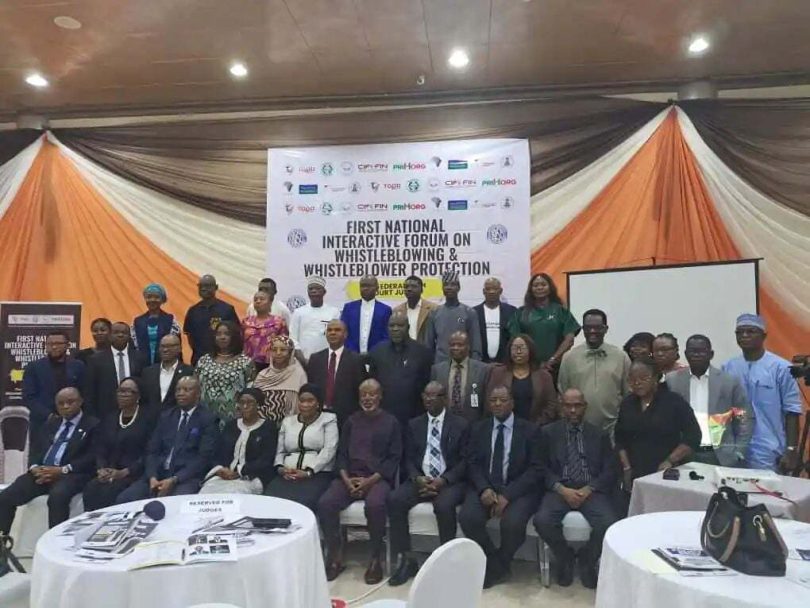By Abubakar Yunusa
John Tsoho, chief judge of the federal high court, says punishing or silencing whistleblowers undermines the justice system and weakens Nigeria’s fight against corruption.
Speaking on Thursday at the first national interactive forum on whistleblowing and whistleblower protection for federal high court judges in Abuja, Tsoho, who was represented by Dorcas Agishi, stated that whistleblowers play a critical role in exposing corruption, fraud, and impunity.
“Without proper protection, whistleblowers face dire consequences, including job loss, social ostracism, and even threats to their lives,” he said.
“When they are silenced or punished, a powerful tool against corruption is lost. This undermines the very foundation of our legal system and our efforts to build a just and transparent society.”
The chief judge said the judiciary has a “profound responsibility” to ensure that courts serve as a safe refuge for individuals who risk everything to reveal the truth.
The forum, organised by the African Centre for Media & Information Literacy (AFRICMIL) in partnership with the MacArthur Foundation, Tap Initiative, National Human Rights Commission, Centre for Fiscal Transparency and Public Integrity (CeFTPI), and Progressive Impact Organisation for Community Development (PRIMORG), focused on strengthening judicial capacity to handle whistleblowing cases.
Delivering the keynote address, Tony Ojukwu, executive secretary of the National Human Rights Commission (NHRC), represented by Harry Obe, director of economic, social and cultural rights, NHRC, said whistleblowers should be regarded as “patriots, not traitors”, noting that their role goes beyond fund recovery to defending citizens’ rights to health, education, clean water and dignity.
“Every naira stolen is a hospital bed empty, a classroom roofless, a road unmade, and a justice system compromised,” he said.
“The judiciary is the critical, non-negotiable linchpin in this ecosystem. It is the institution that translates policy promises into tangible protection and ensures that the act of courage does not become a death sentence.”
He urged the judiciary to adopt progressive interpretations of existing laws, fast-track whistleblower cases, protect anonymity, and award exemplary damages against retaliation.
“My Lords, whistleblowers are not traitors — they are patriots. They are not disruptors — they are defenders of the rule of law. The judiciary must therefore be their shield, not their silence,” Ojukwu said.
He urged the national assembly to treat the Whistleblower Protection Bill as a “legislative emergency”.
He also tasked law enforcement agencies not to only restrict themselves to the recovery of funds but “to investigate and prosecute those who threaten or kill whistleblowers”.
In his goodwill message, Umar Yakubu, executive director of CeFTPI, described whistleblowers as “the sentinels of public integrity”, reiterating that their protection is a “non-negotiable prerequisite for a functional anti-corruption ecosystem”.
“At CeFTPI, we firmly believe that the judiciary is a vital pillar in the fight against corruption and for the promotion of good governance,” he said.
“A robust and supportive judiciary is essential to ensuring that whistleblowers are not only heard but also safeguarded from reprisal.”
Pere Ikuetemi, who spoke on behalf of the minister of justice, raised concerns about how the proposed bill treats compensation for whistleblowers.
He said the draft legislation gives the national whistleblowing council wide discretion on the matter, creating uncertainty for those who come forward with information.
According to him, sustained advocacy at the national assembly is necessary to close such gaps.
Ikuetemi added that beyond legislation, there is a need for proper awareness to guide whistleblowers. He also noted that judges cannot bear the burden of implementation alone since they are “not manufacturers of evidence”.
In 2022, a new draft bill was approved by the federal government and transmitted to the national assembly, but it could not be completed.
In 2024, the whistleblower bill was sent to President Bola Tinubu.
Stakeholders at the event called for the prompt passage of the long-delayed Whistleblower Protection Bill into law.

